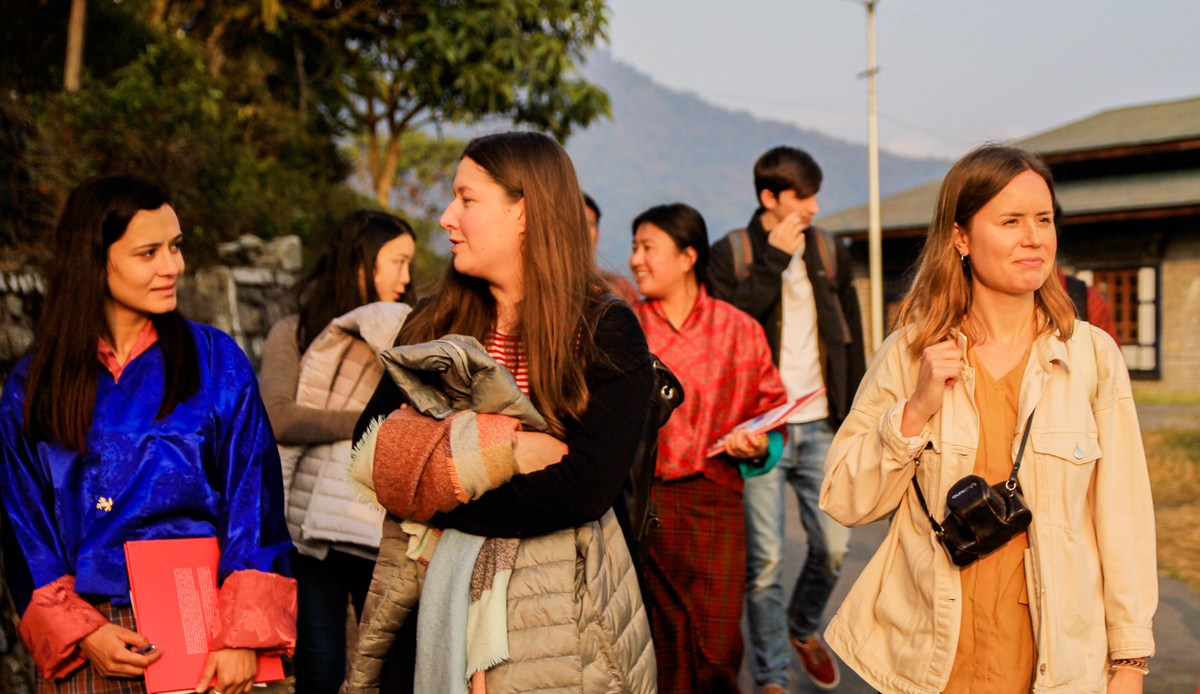PBL South Asia student projects brought together multidisciplinary student teams from the 10 universities to co-create proposals focusing on sustainability, innovation and technology for case beneficiaries. Student projects were focused on global sustainability challenges involving societal stakeholders in the South Asian countries, especially in Nepal and Bhutan, where most of the curriculum development and teaching model adaptation took place. The student-led activities were exploratory, aiming to familiarize Nepalese and Bhutanese HEIs with the facilitation of PBL student projects. The cases also served to train participating faculty and to co-develop contextualised teaching methods for all partners. Upon the completion of PBL South Asia, student case work continues as a permanent feature of curricula at the partnering universities.
While the Covid-19 pandemic interrupted international mobility for years, the consortium rolled out joint activities in online or hybrid mode. Partners implemented in total 154 PBL student projects, of which 19 were international multi-HEI student cases and 135 were locally organised projects at South Asian HEIs. Altogether 1240 students took part in the PBL student cases offered under the project.
The scope of student-led activities varied – between 3 to 18 ECTS depending on the course. Examples of topics included Affordable housing; Construction waste management; Accessible healthcare; IoT based fertiliser system; Modular public housing; Modern organic farm; Traffic congestion in Kathmandu Valley; Solar powered street lighting system; Sustainable municipal landfills; Campus natural disaster management plan using CIS; Culture based theme banquet for tourism; Sustainable tourism in Thangkot jungle; Impact of climate change on hydropower generation in Bhutan; Mapping groundwater potential; Smart renewable irrigation system; Heritage architecture; Construction practices in building operations and so on.
Open student cases snapshot (PDF)

Picture: Carles Martinez
During the project, AITM carried out some 27 local PBL student cases, mostly in the “Enterprise Development Project” course offered under Bachelor's in International Hotel and Tourism Management (BHM) programme, affiliated to International Management Institute (IMI), Switzerland. AITM also adopted PBL methodology in the “Global Marketing Management” Course offered under the Master’s in Business Administration (MBA) programme, affiliated to Birmingham City University. Implementation included active collaboration with stakeholders such as municipalities, hospitality enterprises and small-medium businesses, NGOs and INGOs. AITM teamed up with international students and mentors from Aalto University in 2019 and Delft University of Technology in 2022 for joint student projects and field visits.
Sustainable community reconstruction post-disaster earthquake 2015 (2018-2019) is an example of the pilot cases. AITM and Sustainable Global Technologies studio course at Aalto University partnered to explore alternative ways to support community reconstruction after the 2015 Nepal earthquake. The fieldwork took place in Kathmandu and Dhungentar in 2019 in collaboration with local students from AITM, the International Centre for Integrated Mountain Development (ICIMOD), and the Dhungentar Community. Students from AITM and Aalto University worked on two challenges: "building disaster resilience through communal synergies" and "entrepreneurship opportunities and challenges in a post-disaster community". Details are available in the students’ full reports (AITM and Aalto) and the Aalto team’s website, Instagram and Media Release.
More information about the PBL adapted courses and cases at AITM can be found here.
Under the project, KU adopted new PBL based curricula for courses such as “Illumination Engineering”, “Advanced Illumination Engineering”, and “Acoustic Engineering and Noise Reduction” at undergraduate level; and “RF and Microwave Engineering” course at graduate level, hosted by the Department of Electrical and Electronics Engineering under School of Engineering. Through the adopted courses and several pilot student cases, KU verified and adapted PBL methodology relevant to the local curriculum and context, with a mix of engagement methods (lectures, case studies, simulations, field visits, reflections, research, publications etc.) to facilitate student learning, skills and competence development through the study of concrete PBL cases.
One of the recent student projects entitled “Study of the impact of lighting intervention in historic and touristic cities of Nepal (2022)” jointly offered under the courses “Illumination Engineering” and “Advanced Illumination Engineering” explored current challenges of modern lighting from cultural, architectural and economical points of view, at selected heritage and natural sites in major tourist destination cities. Read more about the case from the students’ Case Snapshot, Final report and Final presentation.
For more information read the PBL adapted courses and cases at KU.
At NEC, PBL methodology was adopted across modules such as core course (“Integrated Digital Electronics”), elective course (“Artificial Neural Network”) and final year projects all at Bachelor’s level in Electronics and Communication Engineering degree programme. PBL student cases under for example the “Integrated Digital Electronics” course engaged local technology businesses and institutions, such as Nepal Innovation Centre, as case owners and beneficiaries. NEC also developed co-mentoring practices on PBL student cases in Nepal with Aalto University, IIT Bombay, Kaunas University of Technology and Delft University of Technology.
In one 2022 project, student teams working on “IoT -based smart hydroponics and fertiliser doser system” investigated challenges and urban farming solutions in rapidly growing metropolitan areas including the capital area.
More information about the PBL adapted courses and cases at NEC can be found here.
At SEC the project integrated PBL based methods in “Final year project I & II” courses, offered in Bachelor's level under Civil Engineering, Electronics and Information Engineering, and Computer Engineering degree programmes. SEC embedded PBL mentoring practices and processes at all departments at the institution and is now active in PBL education promotion, dissemination and outreach in Nepal. SEC also hosted international multidisciplinary students and mentors for joint student projects.
One of the projects,“Popularising earthquake resistant building codes in the construction sector in Nepal (2022)”, built upon a previous PBL South Asia case on reconstruction after the earthquake, exploring themes of information and service management in residential building construction in urban and rural Nepal. The joint teams were formed of International Design Business Management (IDBM) Industry Project Course at Aalto University and Final year project course in Civil Engineering at SEC. Read more from the students’ full final report and guide.
More information about the PBL adapted courses and cases at SEC can be found here.
In August 2019, IITB in collaboration with IISc, hosted an intensive PBL training workshop and brought together academic staff and students from Indian, Nepalese, Bhutanese, Finnish, Dutch and Lithuanian universities, to jointly conduct case studies related to the built environment in the Mumbai area. Altogether 7 teacher-student teams worked for 6 different case beneficiaries. The teams worked in randomly mixed multidisciplinary teams of faculty and advanced students, engaging local industry and community representatives.
The six cases were Affordable housing and slum rehabilitation I (2019), Affordable housing and slum rehabilitation II (2019), Construction and demolition waste management (2019), Accessible Healthcare (2019), Redevelopment of Artist village Belapur (2019), and Liveability in slums (2019)
The training provided unique insights on the relevance and applicability of educational methods applied by the European and South Asian universities to the study of sustainable development challenges, in concrete case settings with societal partners in the Mumbai area. The workshop provided practical training and comparative analysis in the application of PBL methods for sustainable development in the South Asian context, as well as team mentoring practice, fieldwork activities, sustainability and impact analyses, design thinking methods, communication, and dissemination activities.
The pilot teacher training and student cases led to a PBL based Curriculum Design Workshop at IISc . The newly formed PBL Lab at IISc now provides pilot teacher training for the wider PBL South Asia network.
In 2022, IITB participated in 5 mixed international student cases in Nepal and Bhutan with local students and mentors on themes such as Construction Practices in Building Operations in Bhutan, Waste Management in Construction sites in Bhutan, Safety and fatigue in Construction Workers in Nepal, and Sustainable Supply Chain Management in Nepal. These pilot student cases were part of 4 new and adapted PBL courses at IITB.
More information about the PBL South Asia activities is available at IITB and IISc webpages.

Picture: Helmi Korhonen
JNEC incorporated PBL methods and adapted “Project work” courses in Bachelors’ degree programmes (Power Engineering and Mechanical Engineering), and Diploma programmes (Civil, Electrical, Mechanical, Electronics and Communication Engineering, Computer system and Network, Surveying Engineering). JNEC and Aalto University’s Sustainable Global Technology (SGT) programme continue the cooperation on joint PBL courses through EDUCase Platform.
An example of the student projects is “Supporting the development of sustainable waste management in Samdrup Jongkhar, Bhutan 2019-2020”, a case organised jointly by the Department of Surveying and Civil Engineering at JNEC and SGT at Aalto University. Bhutan has shown impressive socio-economic development over the past decades; however, the development path has been accompanied by a shift from biodegradable to inorganic waste as well as a tremendous increase in the amount of waste. The mismanagement of solid waste has resulted in pollution, and current practices are mainly open dumping and burning. The PBL student case scrutinised waste management approaches in Samdrup Jongkhar Thromde. The objective of the study was to learn and interpret the effect of solid waste mismanagement, to calculate waste generation and the approximate amount of greenhouse gases emitted in the landfill. The outcome of the PBL case (JNEC and Aalto) was an engineered landfill design to manage biodegradable and non-degradable waste on site and recommendations that would reduce the waste at grass root level.
More information about the PBL adapted courses and student cases at the JNEC can be found here.